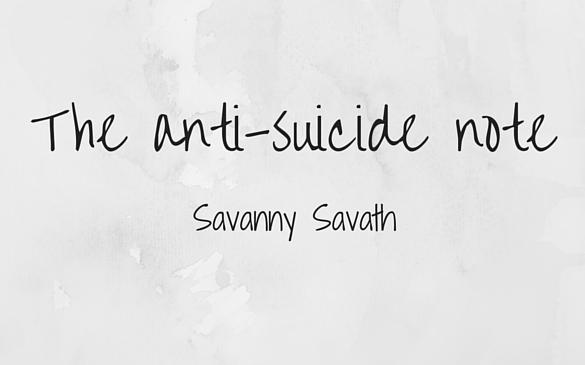By: Savanny Savath, Staff Writer
Dear me two hours ago,
I am writing to tell you that I am sorry. I am sorry it has come to this moment. I am sorry I have waited too long. I, however, do not apologize for the rest of this note.
September was National Suicide Prevention and Awareness Month and when it passed, you thought you could pass (away) too. I am here not only as an affirmation of your existence and strength but as your friend.
“You are worth so much more than your mental illness. Mental illness is a part of you but not the whole you. It is one thing you carry around but you carry so much more than that one thing. You can keep going,” says senior Jordan Crosby.
You are reading this note because you are still going. You are alive as you were two hours ago, seemingly bereft of hope and resources, because there is help around you.
“I have seen students reach out through anonymous platforms more, such as Yik Yak where they can receive support and encouragement from their fellow students. I have seen people ask for help and where to find it, references to contact the Wellness Center and even just students asking for someone to talk to for a brief period [of time],” says senior Abigail Hoffman.
You made it this far in your life and college students are making Yik Yak, a free social-networking app a place for safety and resources. There are more anonymous platforms such as the National Suicide Prevention Hotline, but if you struggle with anxiety, there is a Crisis Text Line available 24/7.
You may still have doubts because the anonymity evokes your fear of invisibility or a lack of self. Then you can make an appointment online to meet with a counselor at the Wellness Center. You receive face-to-face interactions and the service is free and unlimited.
“[The Wellness Center] has two full time counselors. They meet with students for a variety of reasons such as interpersonal issues, difficulty in managing stress/anxiety/depression or if you just need someone to talk or vent to. The meetings are 100 percent confidential so they can only disclose information if they have your consent, even to a parent,” says senior Bailey King.
In addition to anonymous platforms, students, counselors and professors are open to discussing mental health issues and suicide prevention.
“I think these awareness days are important—don’t get me wrong, I don’t think they save lives or anything that simplistic. I think they lead to a next step, a more empathetic campus environment, an opening point for dialogue about anxiety, grief, depression, trauma, eating disorders, you name it. Conversations about suicide eventually turn to some of those root issues. It is always desirable to give more attention to mental health concerns. We are a campus full of minds. They need tending, and it is useful to establish a re al campus awareness that we value taking care of our mental health on this campus,” says Dr. Kim Rostan, professor of English.
Dr. Alliston Reid is a professor of psychology who, with permission from the Wellness Center, had counseled a suicidal student before. He agrees about having more awareness for mental health issues.
He says, “It is to everyone’s detriment that mental health issues are stigmatized. It is as if mental health is somehow different from regular medical health. It makes it much more difficult for people to get help. They are reluctant to seek help. If we had an event [on campus], it would decrease the stigma associated with depression. It would be great.”
“There is so much more. There is such a liberation beyond this,” says Crosby.































